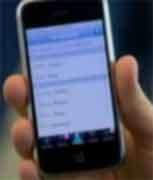Smartphone apps for diabetes: Do they really work?

(HealthDay)—Managing diabetes requires a great deal of time, memory and math skills. There are carbohydrates to count, medication doses to calculate and blood sugar levels to track.
Today, there are numerous applications for smartphones and other devices that can help you keep your diabetes in check, although some people with the disease will tell you the technology still has a ways to go.
Applications—or "apps"—can help you with nutrition advice, carb counting, tracking blood sugar levels, medication alerts and managing kids with diabetes.
Many apps are free, and some offer both paid and free versions. Paid options may offer more bells and whistles, but you might find what you need in a free app.
The big question is: Can these apps help make diabetes management easier?
That depends largely on whom you ask. Some people are thrilled to have the assistance of these programs, while others feel that the currently available apps don't do enough to make them worthwhile.
"It's never been easier to manage diabetes with all the technological stuff we have at our fingertips," said Steve Lisowski, who lives in Chicago. Lisowski has had type 2 diabetes for 15 years, and currently uses an insulin pump and a continuous glucose monitor to help manage his diabetes. He has used nutrition apps and an overall diabetes-management app.
Lisowski said he isn't currently using the diabetes app much because his insulin pump does a lot of the same calculations and tracking.
One thing Lisowski said he would like to see is more compatibility between devices so they could all share information. For example, he said, it would be helpful if the information from his pump could be wirelessly transmitted to an app on his phone.
Lynn Marie O'Flaherty, whose 4-year-old daughter was diagnosed with type 1 diabetes last June, said there's definitely room for improvement in diabetes apps.
"The diabetes apps I have found to date are very disappointing," said O'Flaherty, who is from Yonkers, N.Y. "There are so many things they could be helping type 1 diabetics manage better in their day-in-and-day-out lives."
No matter what apps you use, they're no substitute for regular visits to your doctor and education by a dietitian, an expert said.
"Apps don't replace your doctor," said Shelley Wishnick, a diabetes educator and registered dietitian with the Friedman Diabetes Institute at Beth Israel Medical Center, in New York City. "You still have to understand the disease process. You have to understand your diabetes. An app can't replace your education."
Wishnick said she doesn't have a lot of patients who rely on diabetes apps yet—or those who do don't bring it to her attention. There are a number of apps, such as iBGStar, OneTouch Reveal, OnTrack Diabetes, Glucool, Glooko and Glucose Buddy, that can help you track your blood sugar levels, she said.
But, Wishnick said, nothing beats writing down the numbers.
"If you don't write it, you're not feeling it," she said. But apps that record your blood sugar numbers could be helpful for identifying trends, such as high blood sugar levels after eating certain foods or at particular times during the day, she said.
One area in which many people with diabetes need help is carbohydrate counting. People with type 2 diabetes who aren't using insulin often need to limit the number of carbs they consume in a meal.
Moreover, people with type 1 diabetes and those with type 2 who need insulin must always know how many carbs are in foods so they can give themselves the right amount of insulin, a hormone that helps process carbs.
With her daughter, O'Flaherty said, "Even before she was released from her hospital stay when she was diagnosed as a type 1 diabetic, I had Calorie King and Diabetes 360 installed on my smartphone."
Other nutrition apps include Fooducate, Restaurant Nutrition and GoMeals.
With everything people with diabetes have to keep track of, it can be easy to forget a blood sugar check or miss a dose of medication. Apps such as Glucose Buddy and Dbees can help remind you to take care of these tasks. You set the alerts and reminders you want to receive, and your phone will let you know when it's time for a certain task.
Apps can also help parents manage diabetes in their children. ShugaTrak, for example, sends a text to a parent or caregiver when a child's blood sugar is checked during the school day. Apps can also help parents keep track of injection or pump sites, which need to be rotated regularly.
O'Flaherty said she uses a to-do app to keep track of sites, because she hasn't yet found a diabetes-specific app for this purpose.
"As a population that is increasingly tied to our smartphones, there are many ways a good app could be helpful in managing the overall health of diabetics better," she said. "Diabetics have enough to handle every day and to think about day in and day out. It would be nice to have a comprehensive app to help make this burden a little lighter."
More information: Learn more about the importance of tracking your blood sugar—whether with an app or on paper—from the U.S. Centers for Disease Control and Prevention.
Copyright © 2014 HealthDay. All rights reserved.

















